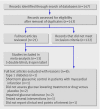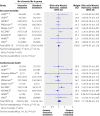Effect of intensive glucose lowering treatment on all cause mortality, cardiovascular death, and microvascular events in type 2 diabetes: meta-analysis of randomised controlled trials
- PMID: 21791495
- PMCID: PMC3144314
- DOI: 10.1136/bmj.d4169
Effect of intensive glucose lowering treatment on all cause mortality, cardiovascular death, and microvascular events in type 2 diabetes: meta-analysis of randomised controlled trials
Abstract
Objective: To determine all cause mortality and deaths from cardiovascular events related to intensive glucose lowering treatment in people with type 2 diabetes.
Design: Meta-analysis of randomised controlled trials.
Data sources: Medline, Embase, and the Cochrane database of systematic reviews.
Study selection: Randomised controlled trials that assessed the effect of intensive glucose lowering treatment on cardiovascular events and microvascular complications in adults (≥ 18 years) with type 2 diabetes.
Data extraction: Primary end points were all cause mortality and death from cardiovascular causes. Secondary end points were severe hypoglycaemia and macrovascular and microvascular events. Synthesis of results Results are reported as risk ratios with 99% confidence intervals. Statistical heterogeneity between trials was assessed with χ(2), τ(2), and I(2) statistics. A fixed effect model was used to assess the effect on the outcomes of intensive glucose lowering versus standard treatment. The quality of clinical trials was assessed by the Jadad score.
Results: 13 studies were included. Of 34,533 patients, 18,315 received intensive glucose lowering treatment and 16,218 standard treatment. Intensive treatment did not significantly affect all cause mortality (risk ratio 1.04, 99% confidence interval 0.91 to 1.19) or cardiovascular death (1.11, 0.86 to 1.43). Intensive therapy was, however, associated with reductions in the risk of non-fatal myocardial infarction (0.85, 0.74 to 0.96, P<0.001), and microalbuminuria (0.90, 0.85 to 0.96, P<0.001) but a more than twofold increase in the risk of severe hypoglycaemia (2.33, 21.62 to 3.36, P<0.001). Over a treatment period of five years, 117 to 150 patients would need to be treated to avoid one myocardial infarction and 32 to 142 patients to avoid one episode of microalbuminuria, whereas one severe episode of hypoglycaemia would occur for every 15 to 52 patients. In analysis restricted to high quality studies (Jadad score >3), intensive treatment was not associated with any significant risk of reductions but resulted in a 47% increase in risk of congestive heart failure (P<0.001).
Conclusions: The overall results of this meta-analysis show limited benefits of intensive glucose lowering treatment on all cause mortality and deaths from cardiovascular causes. We cannot exclude a 9% reduction or a 19% increase in all cause mortality and a 14% reduction or a 43% increase in cardiovascular death. The benefit:risk ratio of intensive glucose lowering treatment in the prevention of macrovascular and microvascular events remains uncertain. The harm associated with severe hypoglycaemia might counterbalance the potential benefit of intensive glucose lowering treatment. More double blind randomised controlled trials are needed to establish the best therapeutic approach in people with type 2 diabetes.
Conflict of interest statement
Competing interests: All authors have completed the ICMJE uniform disclosure form at
Figures








Comment in
-
Intensive glucose lowering treatment in type 2 diabetes.BMJ. 2011 Jul 26;343:d4243. doi: 10.1136/bmj.d4243. BMJ. 2011. PMID: 21791496 No abstract available.
-
Arrow plots show results of meta-analyses of surrogate and clinical outcomes.BMJ. 2011 Sep 27;343:d6126. doi: 10.1136/bmj.d6126. BMJ. 2011. PMID: 21952453 No abstract available.
-
Intensive glucose-lowering therapy in people with type 2 diabetes: what do we learn from a new meta-analysis of randomised controlled trials?Evid Based Med. 2012 Jun;17(3):98-9. doi: 10.1136/ebmed-2011-100230. Epub 2011 Nov 28. Evid Based Med. 2012. PMID: 22127338 No abstract available.
-
ACP Journal Club. Review: Intensive glucose lowering does not reduce mortality in type 2 diabetes.Ann Intern Med. 2011 Dec 20;155(12):JC6-4. doi: 10.7326/0003-4819-155-12-201112200-02004. Ann Intern Med. 2011. PMID: 22184705 No abstract available.
References
-
- Wild S, Roglic G, Green A, Sicree R, King H. Global prevalence of diabetes: estimates for the year 2000 and projections for 2030. Diabetes Care 2004;27:1047-53. - PubMed
-
- Coutinho M, Wang Y, Gerstein HC, Yusuf S. The relationship between glucose and incident cardiovascular events. Diabetes Care 1999;22:233-40. - PubMed
Publication types
MeSH terms
Substances
LinkOut - more resources
Full Text Sources
Other Literature Sources
Medical
